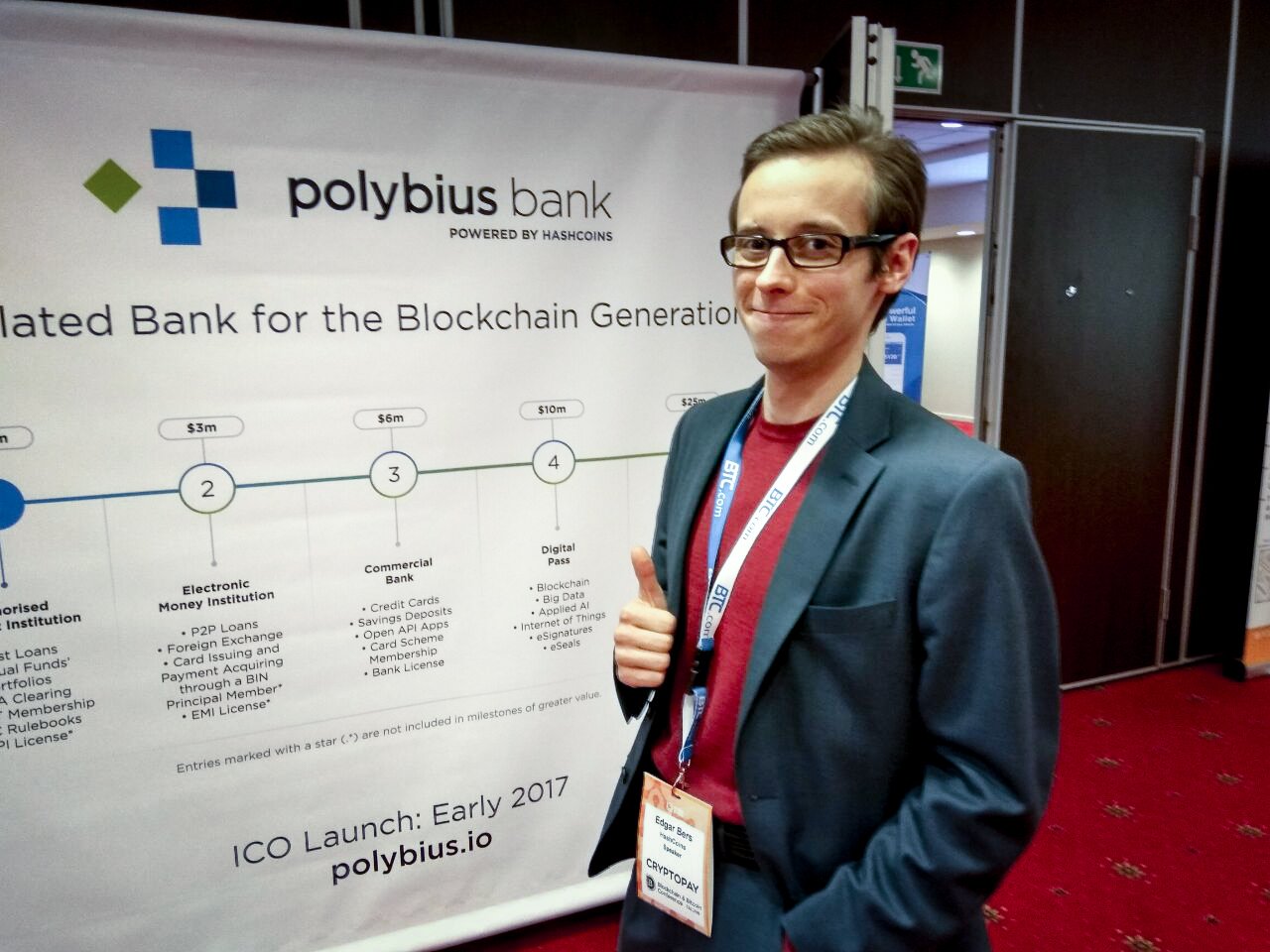Blocking
Our first post about the bank “Polybius” attracted a lot of attention for the Friday evening. Therefore, without blocking, we continue to talk about what constitutes the creation of a modern bank in Europe.

The site bits.media interviewed our speaker Edgar Byrs, in which he described in detail the process of registering the bank and described the types of licenses of financial institutions. Among other things, it answers the questions asked in the comments to the first article.
– How did the idea of such a bank as “Polybius” originate from the very beginning?
I live in Estonia. Estonia is now known as one of the most digitized states in the world, we even have the concept of electronic residency. And we are already accustomed to the fact that all services and services are available online. Everything is digital in Estonia. In theory, opening an account in a bank should not be more difficult than registering an e-mail: fill out an online form, go online authentication – and go ahead. In real life, everything is still not so rosy.
Banks still look like analog dinosaurs: huge commissions, working hours, weekends, lots of manual labor and so on. Looking at this, any technically advanced person could not help but think about how to change this situation. Thus, the emergence of a modern digital bank was a matter of time – when, roughly speaking, those who have the experience, knowledge and desire to make modern digital products will meet with those who have financial expertise, banking experience and an understanding of what can and can not be done Improve in the conditions of existing regulations.
– How can the efficiency of banks be improved?
As usual, the main factor is the human factor. There are too many extra people in modern banks. People who are engaged in checking and conducting transactions. Managers and clerks who serve clients’ offices for transactions that could be conducted online. Analysts who deal with the management of clients’ assets, studying the market and trading. Even cleaners who are forced to clean every day huge areas of these offices and bank branches are all fatty items of expenditure from which you can and need to get rid of.
Even skilled work can already be replaced by robots: for example, the new development of JP Morgan analyzes the financial documents for a few seconds, which required before 360 000 hours of work of lawyers and loan managers per year – this is equivalent to the full employment of two hundred employees receiving Not the smallest salaries, which then add up to the cost of services of the bank itself.
Another thing is that it’s not so easy to do this. In fact, we can say that we need to reinvent the bank – and we know for sure that it is easier and cheaper to do it from scratch than to change the large structure that has already developed for decades. So there was the idea of ”Polybius”: a digital bank created from the very beginning and using all possible technologies of 2017.
– So, everything will be digital in Polybius too
Everything that can be digitized – we will digitize. We will strive to digitize even what can not be digitized. Bank payments are not a rocket science, but simply a data exchange. All transactions are the creation, forwarding and storage of electronic messages. The skeleton of the bank, its idea is the transfer or creation (in the case of loans) of conventional value and the storage of information about it. The first banks did not need anything for this, except for the table and the accounting book (the Italian word banco means “bench, bench, table” on which the money changers were laying coins). To do this, do not need a lot of staff.
Of course, banks have their assets, private customers and other concerns besides payments. But there is also a huge space for optimization at the expense of modern technologies. Human participation is still needed, but in a much smaller quantity: only to control the work of robots and to take crucial critical decisions that we are not yet ready to entrust even to the cleverest AI.
All paperwork in Polybius will be digital . We will use the blocking system for this: the technology itself provides a 100% guarantee that the particular information was placed there at a particular time and will be there without a chance of being erased or altered.
Will this evidence be perceived Legally significant courts of the EU and other countries?
Yes, as soon as we pass an appropriate audit. When we conduct an ICO, launch a banking platform, including storing data in the blockroom, prescribing the Charter and other important legal papers, we will need confirmation that all this is in accordance with European laws. To do this, we will apply for an audit in the Central Bank of one of the countries of the European Union. Most likely, it will be the Central Bank of Finland or the Central Bank of Lithuania. The state banks of both these countries position themselves as maximally focused on the introduction and adaptation of modern technologies. In particular, Lithuania expressly declares its goal as a state – to become the leader of the financial segment in the world division of labor, therefore, both central banks are as loyal to new technologies as possible, including the blockbuster.
Regardless of the chosen country, the Central Bank will conduct a thorough and scrupulous audit of our bank: from the frontend to the backend – from the digital and legal side of the issue. Including, of course, the security of the detachment as a repository of information. Roughly speaking, the regulator will climb with the flashlight to the darkest corners to study the compliance of Polybius Bank with European standards of regulation.
– Are you sure that the blockboy in this bank will not bother them?
The regulator does not really care where and how we store data: even on napkins, at least on the block, If the process of adding, encrypting and storing records is in accordance with the standards adopted by lawmakers. And after the audit is completed, regardless of the Central Bank of which country it will hold, our software will be automatically licensed for banking activities throughout the EU.
All our activities, starting with the ICO and including the actual launch and operation of the bank are governed by the laws of the European Union.
The project team consists of people with a huge expertise in both the technology and banking sector. All our faces can be seen on the Polybius website.
– How long can an audit take?
From two months. While the audit will go on, we will deal directly with the construction of the bank: hiring people, building partnerships and solving many other corporate issues.
– How much does it cost to create a bank?
The cost of creating a financial institution depends on the type chosen. There are only three of them.
- The first type: an authorized payment institution. In fact, a simple payment system. Its creation, including the whole development, costs about $ 1.5 million
- The second type: electronic money institution, the establishment of electronic money. The creation of “own Paypal” costs $ 3 million
- The third type: a commercial bank. The cost of opening the bank is from $ 6 million, including operating expenses for the first year of operation, until the bank’s return on self-sufficiency.
Accordingly, the budget for the launch of Polybius is $ 6 million. To collect these funds, we are launching ICO – a digital analogue IPO, but instead of shares we are selling smart contracts that guarantee investors a share in the bank’s profits.
The audit will begin upon completion of the ICO, when it will be fully understood how much we dispose of for Launch of Polybius and audit of what type of institution we need. A year later the bank should cover at least current expenses at the expense of income and starts generating revenue for investors who have purchased tokens.
– What is ICO?
ICO is a modern way of financing digital projects and technological solutions. This is crowdfunding, based on crypto-currencies. Investors purchase not shares of the bank, but digital tokens, which are a smart contract, in which the necessary obligations are prescribed. ICO will allow you to obtain licenses, audit, hire employees, develop or buy the necessary technology, conduct an advertising campaign and work out the first year and a half before entering operating profit.
– Why ICO? Why is traditional crowbanding not suitable?
We are a digital bank and are focused on digital solutions. In contrast to the traditional crow crowding, including the commission platform, ICO is cheaper: which means that more funds remain for developers.
But the main thing is the presence of smart contracts. In the usual crowdedfunding, the interaction between the payer and the recipient of money is one-time: he made money – he received the goods, the product. A smart contract ensures ongoing cooperation: the purchased Polybius tokens represent a digital commitment in the form of a smart contract for the payment of dividends to their owners.
In this case, the token itself has its own value. Roughly speaking, having financed a new type of pencils on Kickstarter, and having bought them in dollars, in a year you will hardly sell them for the same dollar. And certainly not for two. And the token can be resold. It can grow in price. It has value in the form of a recorded obligation to receive a share of the bank’s profit (dividends). And it is more convenient for them to manage. Each person has a paper contract with a bank at home, which you do not use in practice and hardly even read. A Polybius token will be stored in the Ethereum block. No one can fake it or destroy it. At the same time, you can dispose of it completely remotely.
– How to make money on this for investors? How much money do I need to earn on this?
We make a bank for people, so the minimum entry cost is only $ 10, that’s the cost of one token. On various digital subscriptions people, at times, a month already spend no less. A couple of paid services a month – and already run 10 bucks. Even beer go to drink in Tallinn in the evening after work will cost at least the same amount. At the same time, the value of the token is much higher: it will not expire in a year, and will have value as long as the Polybius bank exists and functions. And as the bank grows, profitability will grow according to the token, and the cost at which it can be resold. So, this is an investment in its pure form: you invest in it once, and then it already works for you. We will allocate 20% of the bank’s profit for dividends, which will be distributed depending on the contribution between all investors who took part in the ICO.
- For all investors who invested up to $ 10,000 from the ICO, there will be a bonus + 25% of tokens. Request for this can be sent to mail info@polybius.io
- During the first week of ICO, there will be bonuses for all investors: + 20% of tokens for the same amount (1.2 tokens for $ 10 instead of one), in the second week + 15%, for the third week – plus 10%, for the fourth – + 5% and from the fifth week for $ 10 will be sold one token.
Each of our investors can create their own bank account and get their own digital ID.
ICO will start this spring. The exact date will be announced soon. In order not to miss this event, and in time to get tokens in the first weeks, while there are bonuses, subscribe to the newsletter with a notice on the site polybius.io









